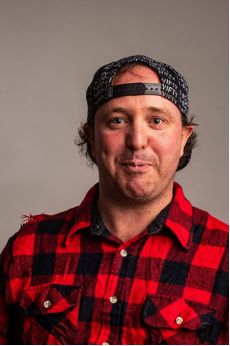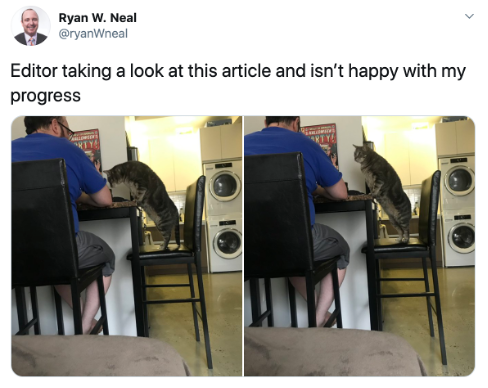At FiComm, we firmly believe in the power of communications to ignite change and fuel business growth. A key component of communicating is building relationships, so we’re embarking on a mission to help our readers get to know the industry players a little better! To kick off the series, we’re interviewing Ryan W. Neal, technology editor at Financial Planning. You’ve probably seen his tweets about Star Wars. You have definitely noticed his backwards cap bopping around at conferences. But how well do you really know him? I introduce Ryan Neal.
Why did you become a journalist? And, if you weren’t a journalist, what would you be?
I mostly became a journalist by accident, though I’ve wanted to be a writer since the sixth grade. If you told college-age Ryan that I was going to be a journalist, I probably would have laughed at you and said something pretentious about being a “sellout.” I was an English and philosophy double major and my school, UC Santa Barbara, didn’t have a journalism program, but I took a “writing for magazines” class that I really enjoyed. The professor encouraged me to get one of my pieces published, and it ended up being the first time I got paid for my writing. That led to another elective where we published a full magazine, writing for the school’s alternative newspaper, and eventually an internship at the local alt-weekly -The Santa Barbara Independent. After my first day in a real newsroom, I was hooked and knew I was never going back.
My final philosophy paper on the philosophy of language did attract some offers to continue studying philosophy post-grad, so I guess if I never discovered journalism, I probably would have done that and tried to make it as a professor somewhere. Or law school – I flirted with the LSATs and did well on some practice tests, but never ended up taking the exam.
What is the best interview you’ve conducted? What made it so great?
In journalism school, I was assigned to cover the Drew Hamilton Houses, a public housing development in Harlem, as my beat. The tenant association president was this long-time housing rights activist Barbara G. Barber, and she was notorious for not speaking to outsiders. It took weeks, maybe months to convince her to meet with me, and when I finally did, it was incredible. She spoke in an almost sing-song voice, was an absolute quote machine and just had incredible insight into the inner-workings of New York public housing from a resident’s perspective.
For fun – I also did an interview with this black metal band, Deafheaven, for a freelance gig as a concert reviewer. The singer and guitar player invited me backstage before a set at St. Vitus in Brooklyn, and we split a bottle of Jameson while discussing their new album, “Sunbather.” It was a great interview and a great show, and the album went on to be one of the most celebrated albums of 2013, but I was in early with my backstage interview.

Who is one person you would love to interview (dead or alive!), and why?
Snoop Dogg. I’ve written about him a few times in my career – for the 20th anniversary of his debut album “Doggystyle,” his publicist ran an essay contest asking “What is your favorite song from the album and why?” I won tickets to see him perform the album in its entirety from the front row with my essay on “Doggy Doggy World” – but have never had a chance to speak to him, and there are just so many things I would love to ask him. In my opinion, he’s the absolute epitome of the American dream – came from one of the most disadvantaged backgrounds in the country to become a multi-millionaire artist, simply doing projects he loves. He does music, acting, investing, fashion, reality TV, a comedic news program, and just so much more. I just want to talk about his life, his music, sports (he runs a huge youth football league in LA), our shared love of George Clinton and Parliament Funkadelic and how he’s stayed married to his high school sweetheart after such a wild life.
What is one thing that drives you nuts about being a journalist?
Other than the existential dread that hangs over an industry struggling to survive? In particular, with business journalism, I’d say all the attempts at “controlling the message.” Whether its subjects who never stray from rehearsed answers and meaningless buzzwords or people who just avoid the press entirely, I just wish people could have more open, honest conversations with me. I understand regulations governing what financial professionals can say; I totally get being apprehensive about saying the wrong thing or being taken out of context, and I know some people have that “always-be-closing” mentality. Still, sometimes I want to scream for people to just stop trying to sell me something and just talk to me like another human being!
What is something you wish everyone knew about journalism?
I wish they understood how “the sausage gets made,” to use a cliché. I think journalism as an industry has done a terrible job explaining how or why reporters do their jobs, and it’s resulted in so many misunderstandings. If people knew more about the entire process – from choosing stories to reporting, writing, editing and publishing – they’d better understand that we aren’t “fans” blindly sharing anything a subject gives us, nor are we “haters” out to get them. If people knew how independent press actually gets created, they would know why it is so vital.
What is one tip you’d give to sources looking to make a connection?
First of all – know the reporter and what he or she covers. With that in mind, reach out with information that isn’t just self-serving, but with something that the reporter’s entire audience could find informative and interesting. What trends or narratives does this information fit into or challenge? What can other readers learn from this?
So, what did we learn about Ryan? He likes Jamo, is a philosophical guru, and truly identifies with the power of the independent press. And, I’m really intrigued by what he’d ask Snoop. In all seriousness though, it’s his advice for sources looking to connect that hit home the most for me. At FiComm, we know how overwhelming reaching out to journalists can be! If you’d like to learn more about Ryan and his beat, his company profile is a great place to start. Check out his latest articles – would the insights you’re bringing help to inform his coverage? Make sure to answer that question before reaching out. And, even if the answer is no, you’re still welcome to laugh along with his tweets: @ryanWneal
